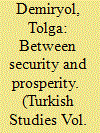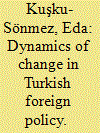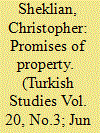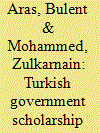| Srl | Item |
| 1 |
ID:
165302


|
|
|
|
|
| Summary/Abstract |
Can natural resources facilitate regional cooperation? Recent discoveries of natural gas in the Eastern Mediterranean have led many to ask whether natural resources can bring peace and prosperity to the region. This article draws upon the contrast between liberal and realist perspectives on interdependence to explicate the extent to which shared economic interests can facilitate political cooperation in a conflict-ridden region. The analysis of Turkey’s Eastern Mediterranean strategy corroborates the proposition that when states prioritize security over prosperity, they will likely continue to escalate political tensions even if this jeopardizes economic gains from cooperation.
|
|
|
|
|
|
|
|
|
|
|
|
|
|
|
|
| 2 |
ID:
165299


|
|
|
|
|
| Summary/Abstract |
This paper offers a contribution to the literature on Turkish foreign policy (TFP) change through quantitative analysis of Turkey’s foreign policy chronology under the ruling Justice and Development Party (Adalet ve Kalkınma Partisi, AKP) between January 2009 and October 2016. It utilizes an original dataset on foreign policy meetings which is then utilized to ascertain the alterations in their volume, direction and purpose. Through this analytical framework, the paper depicts the course of TFP orientations towards different countries and regions, as well as potential explanations of their dynamics. Among its many findings, the paper suggests that bilateral diplomatic activism in the late AKP period can be explained by motivating factors such as trade, geographical proximity and shared identity. Moreover, fluctuations in regional orientations of TFP can be associated with sudden and less calculated reactions to international or domestic political crisis situations.
|
|
|
|
|
|
|
|
|
|
|
|
|
|
|
|
| 3 |
ID:
165297


|
|
|
|
|
| Summary/Abstract |
Once an oppositional ideology in the 1990s that united Muslim intellectuals around a radical critique of the state based on the ideals of democracy, civil society and pluralism, how has Turkish Islamism transformed into a state-centric and conservative world-view? This paper aims to document this transformation by scrutinizing the writings of a group of intellectuals in the context of (I) the 28 February 1997, military memorandum and the subsequent events which culminated in the AKP’s first electoral victory in 2002; and (II) the series of trials that started in 2008 known as the Ergenekon trials through which the AKP gained the upper hand in Turkish politics. In so doing, the paper problematizes the prevalent narratives on the relationship between Islam, on the one hand, and democracy and civil society, on the other, that miss how formulations and articulations of Islamism evolve in changing political contexts.
|
|
|
|
|
|
|
|
|
|
|
|
|
|
|
|
| 4 |
ID:
165298


|
|
|
|
|
| Summary/Abstract |
This study presents a dual approach towards the political economy of corruption under Turkey’s AKP government by differentiating between petty and grand corruption. Findings illustrate that the AKP has been relatively successful in terms of diminishing petty corruption in Turkey which is demonstrated by improved performance in several business indicators, foreign direct investment, income level, and in decreasing rate of corruption-related crimes. However, the AKP failed to move reforms further to regulate the legal framework of political party and electoral campaign finance, which eventually opened the door for cronyism. The concept of state capture helps to explain how corruption is eliminated in some forms (petty) but reproduced in other forms (grand). However, in contrast to insights provided by the state capture literature, this study finds that it is the ruling political party that increased its influence over business groups rather than de novo firms having more control on political elites.
|
|
|
|
|
|
|
|
|
|
|
|
|
|
|
|
| 5 |
ID:
165300


|
|
|
|
|
| Summary/Abstract |
The policies of the Turkish Justice and Development Party (AKP) towards religious minorities exhibits a fundamental ambiguity. Though the AKP has supported a number of high-profile changes in policy towards Armenians and other non-Muslim minorities, the party has left the underlying legal structure intact. This article describes developments in the treatment of non-Muslim vakıfs (often translated at ‘religious foundations’) under the AKP, specifically the restoration of the Holy Cross Armenian Cathedral on the island of Akdamar and the reopening of the Surp Giragos Armenian Church in Diyarbakır. Using these examples, the article demonstrates how the tension between changing policy and enduring legal structure points to an ‘ambiguous attitude’ on the part of the AKP towards Turkey’s religious minority populations.
|
|
|
|
|
|
|
|
|
|
|
|
|
|
|
|
| 6 |
ID:
165301


|
|
|
|
|
| Summary/Abstract |
Turkish policy makers assume a soft power dimension in foreign policy. A number of soft power tools and instruments have been adopted, including state-sponsored educational scholarship programs targeted at international students. This study examines the role of the Turkish government scholarship program (Türkiye Bursları) in generating and disseminating Turkey’s soft power. Through the use of a mixed methods research approach, the study identifies both the importance of the program and the challenges confronting it. By the means of providing higher education scholarships, Turkish government made some progress in publicizing and diffusing its culture and making itself more attractive to international players. There is also the need for reforms to enhance the competitiveness of Türkiye Bursları in relation to other scholarship programs across the globe.
|
|
|
|
|
|
|
|
|
|
|
|
|
|
|
|